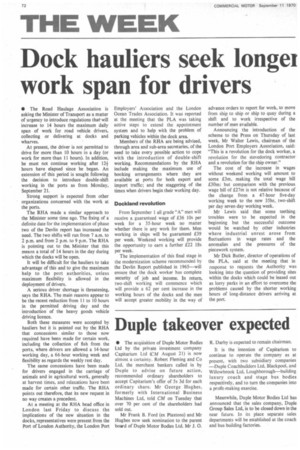Dock hauliers seek longet work span for drivers
Page 74

If you've noticed an error in this article please click here to report it so we can fix it.
• The Road Haulage Association is asking the Minister of Transport as a matter of urgency to introduce regulations that' will increase to 14 hours the maximum daily span of work for road vehicle drivers, collecting or delivering at docks and wharves.
At present, the driver is not permitted to drive for more than 10 hours in a day (or work for more than 11 hours). In addition, he must not continue working after 124 hours have elapsed since he began. An extension of this period is sought following the decision to introduce double-shift working in the ports as from Monday, September 21.
Strong support is expected from other organizations concerned with the work at the ports.
The RHA made a similar approach to the Minister some time ago. The fixing of a definite date for the implementation of phase two of the Devlin report has increased the need. The two shifts will run from 7 a.m. to 2 p.m. and from 2 p.m. to 9 p.m. The RHA is pointing out to the. Minister that this means a total of 14 hours in the day during which the docks will be open.
It will be difficult for the hauliers to take advantage of this and to give the maximum help to the port authorities, unless maximum flexibility is allowed in the deployment of drivers.
A serious driver shortage is threatening, says the RHA. The main reasons appear to be the recent reduction from 11 to 10 hours in the permitted driving day and the introduction of the heavy goods vehicle driving Licence.
Both these measures were accepted by hauliers but it is pointed out by the RHA that concessions similar to those now required have been made for certain work, including the collection of fish from the ports, where drivers are allowed a 14-hour working day, a 66-hour working week and flexibility as regards the weekly rest day.
The same concessions have been made for drivers engaged in the carriage of animals and in agricultural work, generally at harvest times, and relaxations have been made for certain other traffic. The RHA points out therefore, that its new request in no way creates a precedent.
At a meeting at the RHA head office in London last Friday to discuss the implications of the new situation in the docks, representatives were present from the Port of London Authority, the London Port Employers' Association and the London Ocean Trades Association. It was reported at the meeting that the PLA was taking active steps to extend the appointment system and to help with the problem of parking vehicles within the dock area.
Members of the RHA are being advised, through area and sub-area secretaries, of the need to take every possible action to cope with the introduction of double-shift working. Recommendations by the RHA include making the maximum use of booking arrangements where they are available at ports for both export and import traffic; and the staggering of the times when drivers begin their working day.
Dockland revolution From September 1 all grade "A" men will receive a. guaranteed wage of £36 lOs per week for a 35-hour week no matter whether there is any work for them. Men working in ships will be guaranteed £39 per week. Weekend working will provide the opportunity to earn a further £22 18s per week.
The implementation of this final stage in the modernization scheme recommended by the Devlin Report published in 1965—will ensure that the dock worker has complete security of job and income. In return, two-shift working will commence which will provide a 62 per cent increase in the working hours of the docks and the men will accept greater mobility in the way of advance orders to report for work, to move from ship to ship or ship to quay during a shift and to work irrespective of the number of men available.
Announcing the introduction of the scheme to the Press on Thursday of last week, Mr Walter Lewis, chairman of the London Port Employers Association, said: "This is a revolution for the dock worker, a revolution for the stevedoring contractor and a revolution for the ship owner."
The cost of the increase in wages without weekend working will amount to some £3m, making the total wage bill £30m: but comparison with the previous wage bill of £27m is not relative because of the change from a 47-hour five-day working week to the new 35hr, two-shift per day seven-day working week.
Mr Lewis said that some teething troubles were to be expected in the beginning but the successful outcome would be watched by other industries where industrial unrest arose from fluctuations in wage rates and the anomalies and the pressures of the piecework system.
Mr Dick Butler, director of operations of the PLA, said at the meeting that in response to requests the Authority was looking into the question of providing sites within the docks which could be leased out as lorry parks in an effort to overcome the problems caused by the shorter working hours of long-distance drivers arriving at the port.




















































































































































































































































